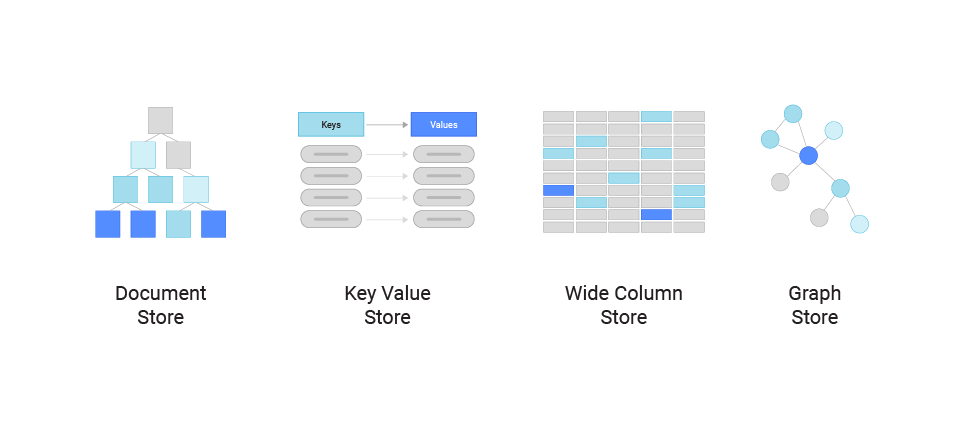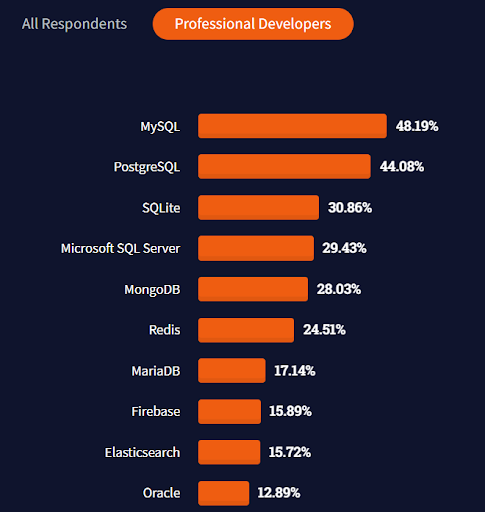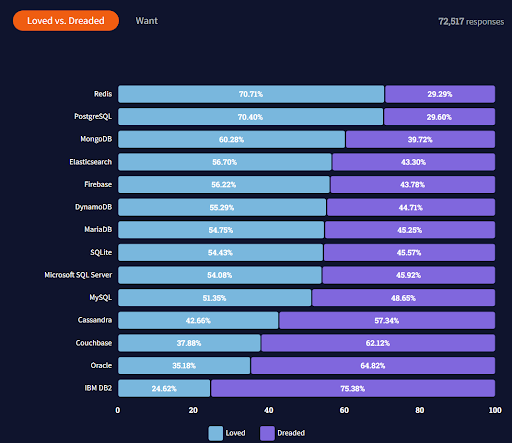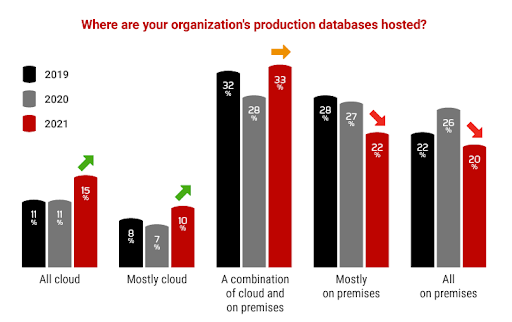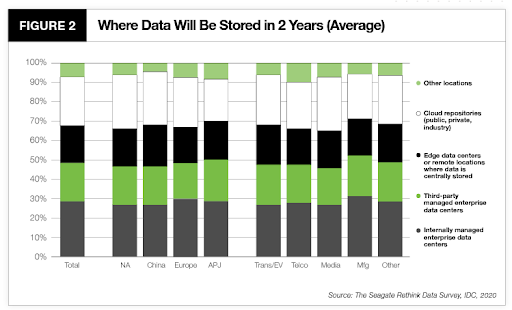Close-to-the-metal architecture handles millions of OPS with predictable single-digit millisecond latencies.
Learn MoreExplore our collection of useful NoSQL database resources to enhance your understanding of important NoSQL concepts and NoSQL trends, as well as access comprehensive NoSQL training resources.
NoSQL Essentials Reading List
Here are some essential books, papers, and articles to read when you’re getting started with NoSQL databases.
Bigtable: A Distributed Storage System for Structured Data: This is the seminal paper introducing Bigtable, a very early NoSQL datastore introduced in 2006. Bigtable, a distributed storage system for structured data, is the ancestor to many of today’s most popular NoSQL databases, such as Apache Cassandra.
Dynamo: Amazon’s Highly Available Key-value Store: This paper presents the design and implementation of Dynamo, a highly available and scalable distributed data store built for Amazon’s platform in 2007. Popular NoSQL databases such as Cassandra and DynamoDB both inherit from the Dynamo model.
An Introduction to Distributed Systems: In the NoSQL database community, Kyle Kingsbury and Jepsen are legendary for “breaking distributed systems so you don’t have to.” This guide is designed as notes for an in-depth course on distributed system fundamentals. If you’re working with a distributed NoSQL database, this is a great resource for learning about key distributed systems terms, an overview of the algorithmic landscape, and exploring production concerns.
Designing Data-Intensive Applications: This book’s description begins “NoSQL… Big Data… Scalability… CAP Theorem… Eventual Consistency… Sharding… Nice buzzwords, but how does the stuff actually work?” If you want a deep dive into the diverse and fast-changing landscape of technologies for storing and processing data, there’s no better resource available.
CAP Twelve Years Later: How the “Rules” Have Changed: Eric Brewer, the man who developed the well-known CAP theorem in 2000, revisits its “2 of 3” formulation 12 years later.
Seven Databases in Seven Weeks: A Guide to Modern Databases and the NoSQL Movement: This is likely the most comprehensive guide to the world of NoSQL databases, with in-depth practical and conceptual introductions to Redis, Neo4J, CouchDB, MongoDB, HBase, Postgres, and DynamoDB.
Cassandra: The Definitive Guide: Cassandra is one of the most widely used NoSQL databases, and this book is a great resource for getting started with Cassandra. It provides the technical details and practical examples you need to put Cassandra to work in a production environment.
NoSQL Distilled: Pramod Sadalage and Martin Fowler, a well-known pioneer of agile software development and self-proclaimed “general loud mouth on Software Development,” provide a concise but thorough introduction to NoSQL in this book. It covers data models, issues with distributed data, thinking about consistency, schema migration, and several examples of different styles of NoSQL databases. Bonus: Here’s a with all the key points summarized.
NoSQL Trends from Industry Reports
The following is a collection of data points from industry research papers on NoSQL databases, SQL, and other general database / NoSQL trends.
Trends on NoSQL, SQL, Graph, Search, and Other Database Types
- About 70% of organizations have more than one database in their technology stack. [Redgate]
- Nearly one-third of tech professionals are managing over 300 databases in their organization’s environment. [Solarwinds]
- Over half of businesses used 25 database instances or less, but larger companies often had up to 10,000 instances (or even more) in production. [Percona]
- Gartner projects that by 2025, NoSQL graph technologies will be used in 80% of data and analytics innovations (an increase from 10% in 2021). [Gartner]
- Few organizations rely only on NoSQL databases; most have mixed SQL + NoSQL or rely solely on SQL. [Redgate]
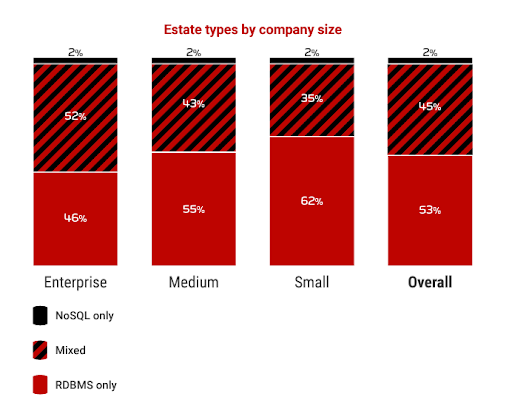
Source: Redgate
- SQL databases are still the most commonly used by developers. [Stackoverflow]
Source: Stackoverflow
- Redis, PostgreSQL, MongoDB, and ElasticSearch are the most loved databases (by developers). IBM DB2, Oracle, Couchbase, and Cassandra are the most hated databases. [Stackoverflow]
Source: Stackoverflow
- Developers with more years of database experience tend to gravitate to Redis and MariaDB; MongoDB’s sweet spot is among developers new to working with databases.
Source: Jetbrains
Cloud Database Adoption Trends
- 33% of tech professionals ranked Cloud DBaaS as the top priority database platform to adopt over the next three years. [Solarwinds]
- Around 22% found that their cloud spending was above expected, while 60% found their cloud spending was about right. For 17%, their cloud spend was lower than expected. [Percona]
- Cloud adoption is growing rapidly, with only one in five companies hosting databases only on-premises. [Redgate]
Source: Redgate
- Managing data in the multicloud ecosystem is a top data management challenge expected over the next two years—with managing data in a hybrid cloud a close second. [IDC + Seagate]
Source: IDC + Seagate
Data Growth Trends
- In 2020, 64.2ZB of data was created or replicated. [IDC]
- By 2025, 175.8ZB of new data will be created per year. [IDC + Seagate]
- The amount of new data created each year is growing at a compound annual growth rate of about 26% between 2015 and 2025. [IDC + Seagate]
- 82% of organizations saw their database footprint grow more than 5% per year. [Percona]
- For 12% of organizations, the volume of data they held doubled or more in the past year. [Percona]
More Data Points Applicable to NoSQL Databases
- Database professionals spend over a third of their time on database maintenance. [Solarwinds]
- Architects are the primary group in charge of making database deployment decisions. [Percona]
- Downtime (59%), performance (51%), and the concern of fixing emergency issues (35%) are the database worries most likely to keep people up at night. [Percona]
- Database performance issues impacted 74% of teams in the past 12 months; unplanned downtime impacted 45%. [Percona]
- 36% of teams use Kubernetes to run databases for development and testing; 23% use it for production. [Percona]
NoSQL Database Evaluation Guides
Here’s a list of vendor-neutral guides that might be helpful as you select the best NoSQL database for your team and projects.
How to Choose the Right Database for your Application (InfoWorld)
Martin Heller is a well-respected industry expert. His database selection guide outlines 12 key questions you should consider when evaluating and selecting a NoSQL database:
- How much data do you expect to store when the application is mature?
- How many users do you expect to handle simultaneously at peak load?
- What availability, scalability, latency, throughput, and data consistency does your application need?
- How often will your database schemas change?
- What is the geographic distribution of your user population?
- What is the natural “shape” of your data?
- Does your application need online transaction processing (OLTP), analytic queries (OLAP), or both?
- What ratio of reads to writes do you expect in production?
- Do you need geographic queries and/or full-text queries?
- What are your preferred programming languages?
- Do you have a budget? If so, will it cover licenses and support contracts?
- Are there legal restrictions on your data storage?
His article expands on each of those questions and explores their implications for your database evaluation.
Essential Reading for Choosing a NoSQL Database (ComputerWorld)
From CAP theorem, to database modeling, to engine comparison and benchmarking best practices, Matt Mombrea provides an overview of the various domains you should know about before you begin the NoSQL database evaluation process.
Types of NoSQL Databases and Key Criteria for Choosing Them (TechTarget)
This article by Dan Sullivan is based on his book NoSQL for Mere Mortals. It introduces the four main types of NoSQL databases (key-value, document, wide column, and graph databases) and explains which applications are best suited for each of them.
Free NoSQL Training Courses
Here is a compilation of free NoSQL training courses that we found. Note that we have not taken most of these courses, so we are sharing the provided course descriptions instead of writing our own.
NoSQL Concepts (Data Camp)
Official Description: “Confused about NoSQL and how it differs from SQL? You’ve come to the right place! In this conceptual course (no coding required), you’ll be introduced to learn the four major NoSQL databases, including key-value, document, column family, and graph. You’ll learn about four popular NoSQL engines—including Redis, MongoDB, Apache Cassandra, and Neo4j—and when to apply them to achieve a specific business requirement. You’ll follow the data escapades of a fictional social network and learn how NoSQL can help them handle and extract insights from unstructured data like social posts. Lastly, you’ll study real use cases of when NoSQL databases were used—giving you the knowledge you need to effectively store data in any situation.”
Terms: “Start course for free”
Introduction to NoSQL Databases (Coursera)
Description: “This course will provide you with technical hands-on knowledge of NoSQL databases and Database-as-a-Service (DaaS) offerings. With the advent of Big Data and agile development methodologies, NoSQL databases have gained a lot of relevance in the database landscape. Their main advantage is the ability to effectively handle scalability and flexibility issues raised by modern applications.
You will start by learning the history and the basics of NoSQL databases and discover their key characteristics and benefits. You will learn about the four categories of NoSQL databases and how they differ from each other. You will explore the architecture and features of several different implementations of NoSQL databases, namely MongoDB, Cassandra, and IBM Cloudant. You will then get hands-on experience using those NoSQL databases to perform standard database management tasks, such as creating and replicating databases, loading and querying data, modifying database permissions, indexing and aggregating data, and sharding (or partitioning) data.”
Terms: “Enroll for free”
NoSQL Essential Training (LinkedIn Learning)
Description: “As the shiny new object in the data world, you might have heard a lot of people talk excitedly about NoSQL and all the things it can do. It’s great in terms of flexibility, speed, and is easy to work with. It’s super scalable, so it can accommodate increased numbers of users as websites and applications grow. But will it replace SQL? Will it make relational databases obsolete? In this course, Mel McGee explains just exactly what NoSQL is, the pros and cons, and tradeoffs you’ll make when using NoSQL. Mel takes a high-level approach without delving into the details of any one NoSQL query language or solution, so if you’re a developer looking for a bigger picture of NoSQL, or an entrepreneur wanting to explore options for your product, or just plain curious about non-relational databases, this course is for you.”
Terms: “Start free month”
ScyllaDB University (ScyllaDB)
Description: “ScyllaDB University is a series of intuitive NoSQL training courses designed as both a ScyllaDB tutorial and a resource for learning basic NoSQL concepts. Courses cover a variety of topics with emphasis on installing ScyllaDB, ScyllaDB in production, ScyllaDB Cloud and other NoSQL database training concepts – including ScyllaDB DBA training.
The ScyllaDB Essentials course is an introductory level course that explains the basics of ScyllaDB including information on NoSQL database fundamentals. By the end of this course, you will understand basic concepts of NoSQL databases. You will gain knowledge of ScyllaDB features and advantages, including ScyllaDB architecture, data model, and installation. This course is the foundation for other ScyllaDB training courses. The Data Modeling course is recommended after you complete the he ScyllaDB Essentials course.
This course is designated for Database Administrators, System Engineers, Developers and Architects who would like to understand NoSQL basics and how those apply to ScyllaDB. Anyone with a need for a highly available fast NoSQL database would benefit from this course.”
Amazon DynamoDB: Building NoSQL Database-Driven Applications (Coursera)
Description: “This course introduces you to NoSQL databases and the challenges they solve. Expert instructors will dive deep into Amazon DynamoDB topics such as recovery, SDKs, partition keys, security and encryption, global tables, stateless applications, streams, and best practices.
DynamoDB is a key-value and document database that delivers single-digit millisecond performance at any scale. It’s a fully managed, multiregion, multimaster database with built-in security, backup and restore, and in-memory caching for internet-scale applications. DynamoDB can handle more than 10 trillion requests per day and support peaks of more than 20 million requests per second.
This course uses a combination of video-based lectures delivered by Amazon Web Services expert technical trainers, demonstrations, and hands-on lab exercises, that you run in your own AWS account to enable you to build, deploy and manage your own DynamoDB-powered application.”
Terms: “Enroll for free”
NoSQL News and NoSQL Database Trends
In this section we have compiled some of the most trusted sources for general database / NoSQL news and NoSQL industry trendsto help you stay on top of all the latest innovation and events.
Datanami
Datanami is a news portal dedicated to providing insight, analysis and up-to-the-minute information about emerging trends and solutions in big data, NoSQL and SQL databases, and other components of the data ecosystem. It examines the avalanche of unprecedented amounts of data and the impact the high-end data explosion is having across the IT, enterprise, and commercial markets.
The New Stack
The New Stack is a media platform for the people who build and manage software the world relies on. They provide context and explanation of at-scale technologies to advance knowledge and create conversations through our coverage of modern architectures, components of the software development life cycle, and operations tools and culture. Their Development> Data area covers NoSQL trends and technical deep dives.
Dzone
DZone.com is one of the world’s largest online communities and leading publisher of knowledge resources for software developers. Every day, hundreds of thousands of developers go to DZone.com to read about the latest technology trends and learn about new technologies, methodologies, and best practices through shared knowledge. Their dedicated Database Dzone covers NoSQL, distributed databases, traditional relational databases, and more.
TechTarget SearchDataManagement
SearchDataManagement.com is a knowledge guide for data management professionals and business intelligence leaders. They provide news articles, learning guides, expert advice, and customized research that offer a rich collection of insight, tips, and advice on how you can efficiently manage your data supply chain. Topics covered include big data, database management systems (DBMS), database comparisons (columnar vs. relational vs. NoSQL), database performance and tuning, and more.
Database Trends and Applications
Database Trends and Applications is a magazine covering data and information management, big data, and data science. In addition, our website, dbta.com, connects visitors with white papers, webinars, and other learning opportunities in the field. Their magazine and website deliver advanced trends analysis and case studies serving the IT and business stakeholders of complex data environments.
InfoWorld
InfoWorld, the leading voice in emerging enterprise technology, is the go-to resource for developers, architects, and business leaders launching next-generation initiatives on scalable cloud platforms, where such future-focused tech as AI/machine learning, big data analytics, and NoSQL databases evolve continuously. InfoWorld serves those determined to seek business advantage by staying ahead of the technology curve.
InfoQ
InfoQ’s editorial team is made out of software engineers who are constantly pushing the barrier of innovation one step further in their professional lives. The community is about sharing knowledge and experience between people who direct innovation and change in software. Their mission is to help dev teams adopt new technologies and practices. InfoQ provides software engineers with the opportunity to share experiences gained using innovator and early adopter stage techniques and technologies with the wider industry.
ScyllaDB NoSQL Blog
Our NoSQL blog keeps you up to date with recent news about the ScyllaDB NoSQL database and related technologies, success stories and developer how-tos.
